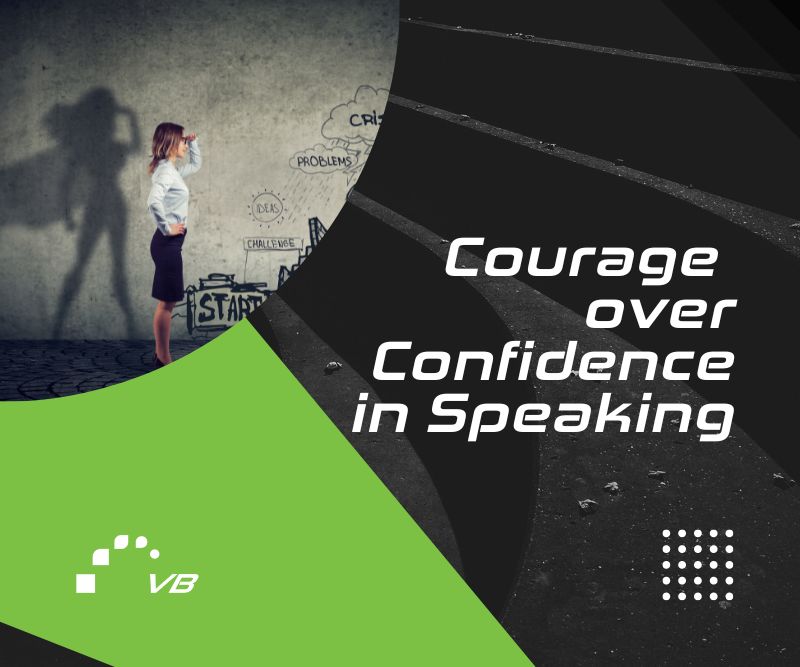
“Why don’t you need to feel confident or wait to feel confident to speak a language.”
Many language learners will feel insecure when attempting to speak a target language they have spent some time learning. Traditional teachers will repeat in a mantra, “You need to be more confident. Once you are confident, you will speak”. What happens is that new students, when attempting to speak in their target language, will feel a sense of nervousness and stress and then may rearrange themselves to avoid speaking the language they have been working so hard to learn because well they are “not there yet” they need to wait for the confidence boost. The truth is you, by no means, must not wait to be confident; you need courage.
Confidence is developed over time, evolving, growing, and in the end, your hard work pays off by earning confidence. Confidence is not an initial mechanism built within us that we can be confident via osmosis. The act of attainment of confidence is via courage.
Courage is vital for language learning; why?
It is normal when learning a language to fear otherness. It will only come to you naturally if you have certain talents or gifts in this domain. You may feel embarrassed for attempting to speak, and it is not quite getting there, and you’re wasting your interlocutor’s time. So instead of immersing yourself in this new world, you focus on continuing listening, reading, and apprehending new vocabulary until your confidence comes to you. Contrary to your beliefs, not being courageous enough to dare to speak and instead playing a sitting and waiting game will hinder your learning progress. Confidence will not come to you unless you dare to speak.
In anything you may attempt in your life, not just learning a new language, in which you are placed in a different situation from your routine, it is scary and unfamiliar territory; thus, there is an element of fear involved. As humans, our brains are plastic, meaning they can grow, adapt and evolve, rewiring our brains at any age. We can learn new things at any moment, and a beginner’s mind is ready. This takes courage if you set yourself a new challenge, such as learning a new language. Indeed, you can think about pivotal points in your life, such as meeting a new date, going on a zoom call with a stranger, or going to a job interview. Was it your courage that went through those moments to just do it, or did you wait for a confidence spell to push you forth?
The answer will likely be apparent to you now; courage is a key. So now you are probably thinking, how can I be more courageous?
#1 – Fake it until you make it
Gaining confidence will also mean faking your confidence. This is the key to many successful people, who always claim they made it to the top by faking it until they made it. This is no different for language learning. Sometimes you may see complete beginners entirely going all in and ordering their favorite brunch in the target language they were learning. You seem completely impressed by how fast they learn the language, and they admit to you, they have just started as a beginner and are not sure if the order will even come back correctly, which in the end, it doesn’t. It’s all about the illusion, and you will realize fear is an illusion in nature. You can beat this fear by being courageous and just blagging it initially. This is the first step to breaking the barrier between you, the otherness, and your target language.
#2 – Dare to have a beginner mindset
Contrary to popular belief about keeping extremely high expectations, it would be best if you keep your expectations at the beginner’s level for your language learning evolution. Do not expect perfection, expect to make mistakes, and expect to feel defeated and like you want to give it all up. This is a new skill set you are trying to attain. You can think back to any skill you have acquired now. For example, learning an instrument, you surely butchered a few songs before they sounded like melodies. You will do the same with language learning. You must not go for perfectionism, have fun making mistakes and tell fantastic stories once you have mastered the language. You cannot learn any language by passing the embarrassing stage, and it’s a right of passage, so own it!
#3 – Practice for progress
After practice and being given some time, you will eventually see progress, and it will naturally boost your confidence. But this cannot happen unless you dare to attempt, which will allow the road of progress to be built. Tracking your progress by keeping a log of dates on the work you have down and things you have learned and seeing how far you have come will be a good indicator of how you are doing. Of course, to progress, you must ensure your time management correctly and allow your mind the time to allow the learning experience to commence.
#4 – Do not wait. Go for it!
Confidence is not static; it is dynamic. Keep in mind that if you have gained some confidence and it is helping you with your target language, you need to be courageous. Otherwise, you will remain in plateaus, as you will be unable to achieve your next goals, which may also be contaminated with elements of fear, maybe for differing reasons when you were a total beginner. Still, nonetheless, you must continue to persevere.
DO NOT WAIT. GO FOR IT!
The waiting game does not do you justice in language learning. Confidence will not come to you magically learning more vocabulary or exposing yourself to more listening. You need to be courageous to break the barrier of fear. Thus, you need first to be courageous, improve your skills, see the progress and then enjoy the confidence boost that your hard work and brave act combined have granted you. Do not expect that Confidence will open the doorway to acquisition. You need to dare, be bold, and break the barriers that tell you can’t do it because you certainly can!
SPEAK BUILD CONTRIBUTE
Used sources:
Hardy, D. (2020). The compound effect (10th-anniversary edition): Jumpstart your income, life, and success. Hachette UK.
Pagels, D. (1999). The language of courage and inner strength: A wonderful gift of inspiring thoughts. Blue Mountain Press.
Alford, D. J., Alford, P., & Haacke, C. J. (n.d.). Robin`s first flight – Wings of courage: ESL -English as a second language. Mfg Application Konsulting Engr.
Language is courage. (1994). Reading Rushdie, 209-219. https://doi.org/10.1163/9789004483736_017
Easter traditions in the USA, Germany, and Mexico
People celebrate Easter in many countries and have different traditions
6 Tips to defend your point of view in English
Standing up and defending your point of view might be
International Women’s Day
International Women's Day is celebrated every year on March 8th.






